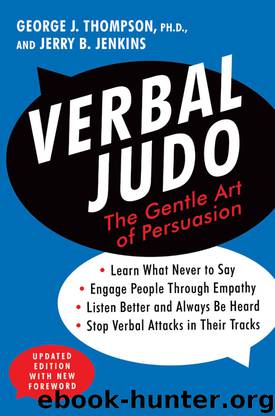Verbal Judo by George J. Thompson PhD

Author:George J. Thompson, PhD
Language: eng
Format: epub
Publisher: HarperCollins
Published: 2013-03-11T04:00:00+00:00
AN UNNATURAL ACT
Listening is not a natural act. It is highly artificial and artistic. In fact, listening is not the opposite of talking, and if you think it is, you’re as brain-damaged as I used to be. In our culture, the opposite of talking is more like waiting to interrupt.
Active listening is a highly complex skill that has four different steps: Being open and unbiased, hearing literally, interpreting the data, and acting.
Don’t ever assume people are open and ready to listen. One thing that makes my course different from so many others is that I, having been on the streets, know that communication is not the listener’s responsibility. It is the sender’s. As a police officer I had to ensure that I made people more cooperative and willing to be voluntarily compliant.
High school teachers tell me, “I have a bad class. What can I do about that?”
I say, “There is no such thing as a bad class. Only bad teaching.” Sorry, but the responsibility of getting through lies with the teacher. I almost always start out with difficult classes, because the attendees are usually mandated to be there. They don’t think they want to be taught. They’re already professionals. They’re on the street, dealing in dangerous situations all day, and they’re pretty sure that some Ph.D. won’t be able to tell them anything new—especially about talking their way out of situations rather than taking charge physically. I have to perform in such a way as to get and hold their attention.
Take the responsibility to be a good communicator. Get people to listen by the power and manner with which you send your message.
When you’re on the listening end, you may be open and unbiased and able to literally hear, but how do you interpret what you’ve heard so you can decide on a course of action?
Start with one of my undeniable, inarguable, street-survival truths: People hardly ever say what they mean. If you react to what they say, you make a mistake. People under the influence of liquor, drugs, rage, fear, anxiety, ignorance, stupidity, or bias, don’t mean anything they say.
If you begin to grasp this point, you can become a more effective communicator. Here are two examples.
Download
This site does not store any files on its server. We only index and link to content provided by other sites. Please contact the content providers to delete copyright contents if any and email us, we'll remove relevant links or contents immediately.
The Compound Effect by Darren Hardy(8949)
Wonder by R.J. Palacio(8573)
Atomic Habits: Tiny Changes, Remarkable Results by James Clear(8327)
Becoming Supernatural by Dr. Joe Dispenza(8204)
Wonder by R. J. Palacio(8100)
Change Your Questions, Change Your Life by Marilee Adams(7762)
The Road Less Traveled by M. Scott Peck(7594)
Born to Run: by Christopher McDougall(7121)
Daring Greatly by Brene Brown(6504)
Big Magic: Creative Living Beyond Fear by Elizabeth Gilbert(5757)
Grit by Angela Duckworth(5609)
The Slight Edge by Jeff Olson(5410)
Men In Love by Nancy Friday(5234)
The Wisdom of Sundays by Oprah Winfrey(5154)
You Are a Badass at Making Money by Jen Sincero(4925)
Fear by Osho(4728)
The Miracle Morning by Hal Elrod(4716)
The Four Tendencies by Gretchen Rubin(4595)
Rising Strong by Brene Brown(4451)
